Diplomatic Bluebook 2020
Chapter 2
Japan's Foreign Policy that Takes a Panoramic Perspective of the World Map
7 Regional and Inter-regional Cooperation
The Asia-Pacific region is one of the world's growth centers, and realizing a peaceful and prosperous region is one of the priority issues in Japan's diplomacy. From this perspective, Japan places a high priority on working with its neighbors to achieve a rules-based “Free and Open Indo-Pacific” (FOIP) based on international law through various regional cooperative frameworks, including Japan-ASEAN, Japan-Mekong cooperation, ASEAN+3 (Japan, China and the ROK), East Asia Summit (EAS), Japan-China-ROK trilateral cooperation, and Asia-Pacific Economic Cooperation (APEC), while maintaining the Japan-U.S. Alliance as the cornerstone of its foreign policy. In addition, in pursuing synergy between the FOIP and the ASEAN Outlook on the Indo-Pacific (AOIP) adopted by ASEAN in June, Japan intends to enhance cooperation with the countries of ASEAN and contribute to the stability and prosperity of the Indo-Pacific region as a whole by respecting the centrality and unity of ASEAN (see the Special Feature on page 81).
A free and open Indo-Pacific based on the rule of law, founded upon the peace and prosperity of the region-ASEAN member states, which lie at the intersection of the Indian and Pacific Oceans, adopted the ASEAN Outlook on the Indo-Pacific (AOIP) at the ASEAN Summit held in June, demonstrating their unity and centrality.
The AOIP sets out the following objectives to contribute to the maintenance of peace, freedom and prosperity: (1) Offer an outlook to guide cooperation in the region; (2) Strengthen confidence and trust; (3) Strengthen the existing ASEAN-led mechanisms; and (4) Explore other ASEAN priority areas of cooperation. The AOIP advocates promoting cooperation in fields such as maritime cooperation, connectivity, the SDGs, and economic and other possible areas of cooperation, based on the principles of strengthening ASEAN Centrality, openness, transparency, inclusivity, a rules-based framework, good governance, respect for sovereignty, non-intervention, complementarity with existing cooperation frameworks, equality, mutual respect, mutual trust, mutual benefit, and respect for international law such as UN Charter, the 1982 UN Convention on the Law of the Sea (UNCLOS), and other relevant UN treaties and conventions.
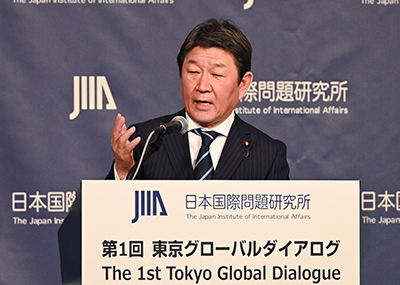 Foreign Minister Motegi announcing the details of the Initiative on Overseas Loan and Investment for ASEAN, at the 1st Tokyo Global Dialogue (December, Tokyo)
Foreign Minister Motegi announcing the details of the Initiative on Overseas Loan and Investment for ASEAN, at the 1st Tokyo Global Dialogue (December, Tokyo)Since Prime Minister Abe's declaration in 2016 of the concept of a “Free and Open Indo-Pacific” (FOIP), Japan has been advancing initiatives toward (1) the promotion and establishment of fundamental principles such as the rule of law, freedom of navigation and free trade, (2) the pursuit of economic prosperity, and (3) ensuring peace and stability. Against this backdrop, it is epochal that ASEAN itself has published the AOIP with a view to strengthening connectivity in the Indo-Pacific. Japan has declared its full support for the AOIP, and will cooperate with ASEAN toward its realization. At the same time, Japan aims to pursue synergy of the FOIP, the AOIP, and other initiatives by countries that share the same purpose, as well as to contribute to the overall stability and prosperity of the Indo-Pacific region.
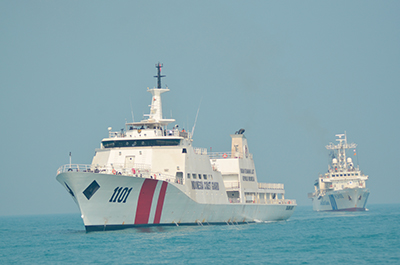 Dispatch of patrol boats to Indonesia (July 2018; Photo: Japan Coast Guard)
Dispatch of patrol boats to Indonesia (July 2018; Photo: Japan Coast Guard)Japan and ASEAN have already launched concrete cooperation initiatives that demonstrate the synergy between FOIP and the AOIP. To date, Japan has engaged in numerous concrete cooperation projects to strengthen maritime law enforcement capability through means such as the provision and dispatch of patrol boats and other means, and enhancing connectivity by developing the East-West and Southern Economic Corridors, which contribute to the economic growth of the Mekong region. On top of these, Prime Minister Abe announced the launch of the Initiative on Overseas Loan and Investment for ASEAN to provide financial backing to the Joint Statement of the 22nd ASEAN-Japan Summit on Connectivity, issued at the ASEAN-Japan Summit held in November. Under this Initiative, Foreign Minister Motegi announced in December that the initiative aims at mobilizing 3 billion US dollars from public and private sectors over the next three years (2020-2022), including through a total of 1.2 billion US dollars overseas loan and investment for ASEAN by JICA in the fields of quality infrastructure development, improving financial access and supporting women, and green investment. Furthermore, the Japan-ASEAN Technical Cooperation Agreement was signed in May, enabling the implementation of technical cooperation for ASEAN as a whole. The first project under this agreement was the Training in Cyber Security, in January 2020.
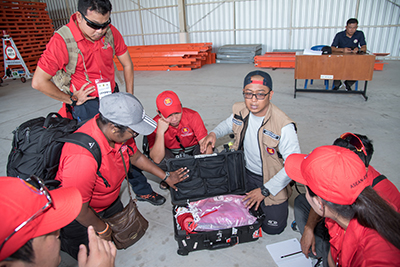 Human resource development in the area of disaster prevention – Training on standing by without sleep. Photo: AHA Centre*
Human resource development in the area of disaster prevention – Training on standing by without sleep. Photo: AHA Centre*In line with the principles established in the AOIP, Japan will promote cooperation with ASEAN countries more than ever before in the areas of strengthening maritime security based on the rule of law, strengthening connectivity through quality infrastructure, and the sustainable use of marine resources including measures to combat illegal fishing. Japan will work together with all ASEAN countries toward the realization of a free and open Indo-Pacific.
- *ASEAN coordinating Centre for Humanitarian Assistance on Disaster Management
(1) The Association of Southeast Asian Nations (ASEAN)
At the ASEAN-related Summit Meetings held in November 2015 (Kuala Lumpur, Malaysia), it was declared that the three councils of the “ASEAN Political-Security Community Council,” the “ASEAN Economic Community Council,” and the “ASEAN Socio-Cultural Community Council” (Kuala Lumpur Declaration on the Establishment of the ASEAN Community) would be established by the end of 2015. Also, “ASEAN2025: Forging Ahead Together” was adopted as a guiding policy for the ASEAN Community for the 10 years from 2016 to 2025. In East Asia where ASEAN plays an important role as a center of regional cooperation, a multi-layered regional cooperation, such as ASEAN+3 (Japan, China and the ROK), East Asia Summit (EAS), and ASEAN Regional Forum (ARF), is operating with ASEAN at its center, and cooperative relationships in a wide range of areas including politics, security and the economy have been established. On the economic front, ASEAN has concluded the ASEAN Free Trade Area (AFTA) as well as other EPAs and FTAs with various countries including Japan, China, the ROK and India, thereby expanding the ASEAN-centered free trade zone. With regard to the Regional Comprehensive Economic Partnership (RCEP), the goal is to sign this within 2020 based on the Joint Leaders' Statement from November 2019.
ASEAN is situated in a geopolitically important location and faces important sea lanes for Japan. Its stability and prosperity deeply affects not only those of the East Asian region but also of the international community. Therefore, it is important for the entire international community, including Japan, that ASEAN advances its integration in accordance with values such as the rule of law.
(2) Issue of the South China Sea
The issue with regard to the South China Sea is directly related to the peace and stability of the region and is a legitimate concern of the international community. As a stakeholder that makes use of the South China Sea, the issue is also an important matter of concern for Japan, which depends for most of its resources and energy on sea transport. It is necessary for the international community to cooperate toward the maintenance and development of open and stable seas.
In the arbitration proceedings instituted by the Government of the Philippines as to the disputes between the Philippines and China regarding the South China Sea under the United Nations Convention on the Law of the Sea (UNCLOS), the Arbitral Tribunal rendered the final award on July 12, 2016. Japan issued a statement by the Foreign Minister on the same day, stating that, “As the Tribunal's award is final and legally binding on the parties to the dispute under the provisions of UNCLOS, the parties to this case are required to comply with the award. Japan strongly expects that the parties' compliance with this award will eventually lead to the peaceful settlement of disputes in the South China Sea.”
In 2019, China further continued unilateral actions that challenge the status quo and escalate tensions as well as attempts to render the resulting of such conduct faits accomplis; for instance, it deploys on disputed features a missile system that captures almost the entire South China Sea in its range and conducts anti-ship ballistic missile test launches. The international community including Japan has expressed serious concern over these actions. Japan has to date consistently supported the full adherence to the rule of law in the South China Sea, and places importance on freedom of navigation and overflight as well as assistance for safe sea lanes. Japan has also emphasized the importance for all the concerned parties related to the South China Sea to work toward peaceful settlement of disputes based on international law, as reflected in the UNCLOS. Furthermore, Japan has pointed out that China's claims to “historical rights” over the South China Sea lack a clear basis under international law, and that such rights were also clearly dismissed in the final arbitration award against China that was announced in 2016. Japan has also pointed out that China's claims to its baseline in the South China Sea issues are inconsistent with UNCLOS. In 2018, negotiations on the Code of Conduct (COC) in the South China Sea commenced between China and ASEAN. Japan has advocated for the importance of such efforts leading to demilitarization of the area and to the realization of a peaceful, open South China Sea.
(3) Japan-ASEAN Relations
ASEAN exerts its centrality and is the engine of various regional cooperation. Therefore, realizing a more stable and prosperous ASEAN is absolutely essential to the stability and prosperity of the region as a whole. Based on this recognition, Japan has announced that it will actively support ASEAN's efforts in accordance with “ASEAN Community Vision 2025” for further integration even after the establishment of the ASEAN Community, while steadily implementing the “Vision Statement on ASEAN-Japan Friendship and Cooperation” and the “Joint Statement” that were both adopted at the ASEAN-Japan Commemorative Summit Meeting held in Tokyo in 2013.
In 2019, through the Japan-ASEAN Foreign Ministers' Meeting held in August and the 22nd Japan-ASEAN Summit Meeting held in November in Thailand, the ASEAN Chair, the participants affirmed that they would continue to further strengthen cooperative relations over a broad range of fields. At the Japan-ASEAN Summit Meeting in November, Prime Minister Abe announced full support for the ASEAN Outlook on the Indo-Pacific (AOIP), which ASEAN adopted under its own initiative in June. At the same time, he also stated that Japan would pursue synergy between AOIP and Japan's concept for a “Free and Open Indo-Pacific” (FOIP), while also continuing to strengthen cooperative relations between Japan and ASEAN. In addition to a Chairman's Statement released at this Summit Meeting, the Joint Statement of the Japan-ASEAN Summit Meeting on Connectivity was released with the approval of all of the participating countries. It was also affirmed that the parties would continue working together with ASEAN to achieve a “Free and Open Indo-Pacific.” What is more, in order to lend its support to this Joint Statement financially, Prime Minister Abe announced the launch of the Initiative on Overseas Loan and Investment for ASEAN. He stated that Japan would aim to mobilize funds including private sector funds and was prepared to double the investment and loans of JICA with the focus on the ASEAN region in the fields of quality infrastructure, financial access, support for women, and green investment. In addition, he made mention of the Japan-ASEAN Technical Cooperation Agreement, stating that as the first project under the Agreement, Training in Cyber Security would be implemented in Japan in January 2020.
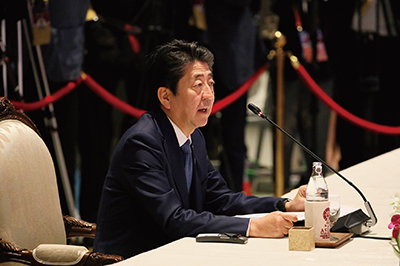 Prime Minister Abe speaking at the Japan-ASEAN Summit Meeting (November 4, Bangkok, Thailand; Photo: Cabinet Public Relations Office)
Prime Minister Abe speaking at the Japan-ASEAN Summit Meeting (November 4, Bangkok, Thailand; Photo: Cabinet Public Relations Office)On the security front, Prime Minister Abe stated in regards to defense cooperation that Japan would promote cooperation under the Vientiane Vision (Japan's Defense Cooperation Initiative with ASEAN), focusing primarily on the areas of humanitarian assistance, disaster relief, and maritime security. Regarding regional and international affairs, concerning North Korea, Prime Minister Abe stated that no time can be lost in rescuing the abductees and asked for the continued understanding and cooperation of ASEAN countries toward the early resolution of the abductions issue. Regarding the South China Sea issue, he expressed Japan's serious concern about the present situation in the South China Sea, while noting the necessity for ASEAN countries to call for improvements in one voice in the worsening present situation. He also stated that Japan would continue to spare no effort in offering maximum cooperation.
On the economic front, through official development assistance (ODA) and the Japan-ASEAN Integration Fund (JAIF), Japan has supported the deepening of ASEAN integration in a variety of areas, including support for narrowing the economic disparities within the region by enhancing ASEAN Connectivity. At the Japan-ASEAN Summit Meeting in Thailand in November, Prime Minister Abe welcomed the signing of the First Protocol to Amend the Agreement on Comprehensive Economic Partnership among Japan and Member States of the Association of Southeast Asian Nations, and stated his hopes for its early entry into force in order to further promote trade in services and investment.
In addition, Prime Minister Abe shared a number of Japanese initiatives and made positive mention of Japan-ASEAN cooperation that was being deployed across a wide range of areas. Examples of this include the launch of a public-private sector council for the ASEAN Smart Cities Network (ASCN) High Level Meeting, the Japan-ASEAN Transport Partnership Initiative, the Fourth Industrial Revolution (4IR) Dialogue, “WA Project: Toward Interactive Asia through Fusion and Harmony” (Asia Center of the Japan Foundation), Sports for Tomorrow, and more.
At the Summit Meeting, the ASEAN side expressed their gratitude and support for the Initiative on Overseas Loan and Investment for ASEAN, which is a recent, new initiative of Japan, as well as the Training in Cyber Security, which is the first project based on the Japan-ASEAN Technical Cooperation Agreement. In addition, the ASEAN side also offered it's appreciation of the Asia Center of the Japan Foundation and expressed its hopes regarding future activities of the center. In addition, it also expressed its gratitude for Japan's cooperation toward ASEAN that includes initiatives such as the ASEAN Smart Cities Network (ASCN) High Level Meeting (Yokohama) held in October, the creation of the Fourth Industrial Revolution (4IR) Dialogue, the hosting of ASEAN-Japan Day (Hanoi, Viet Nam), and JENESYS.
(4) Mekong-Japan Summit Meeting (Participating Countries: Cambodia, Laos, Myanmar, Thailand, Viet Nam and Japan)
The Mekong region (Cambodia, Laos, Myanmar, Thailand and Viet Nam), situated in a strategic location for land and sea transport, is a promising partner for further growth, which has been achieving strong economic growth. Peace and prosperity in the Mekong region are extremely important to Asia as a whole, including Japan, since it will contribute to narrowing economic disparity and promoting regional integration within ASEAN. The development of hardware infrastructure has progressed in recent years in the Mekong region, and there has been a steady increase in the number of Japanese companies expanding their businesses in the region, as well as direct investment from Japan, which testifies to great expectations for the further stimulation of economic activities in the future.
The Mekong-Japan Initiative for SDGs toward 2030 was adopted at the 11th Mekong-Japan Summit Meeting held in Bangkok, Thailand, in November 2019. It was announced that under this initiative, the countries of the Mekong region and Japan would establish environmental and urban issues, sustainable natural resource management and utilization, and inclusive growth as priority areas and work to achieve the SDGs in the Mekong region. The heads of state of Mekong countries expressed their gratitude for Japan's continued support and welcomed the fact that Japan became a development partner to the Ayeyawady – Chao Phraya – Mekong Economic Cooperation Strategy (ACMECS) in 2019. Japan will continue to contribute to the prosperity and development of the Mekong region as a trusted partner for Mekong countries.
The year 2019, which marked the 10th anniversary of the 2009 “Mekong-Japan Exchange Year” between Japan and Mekong countries was designated as “Mekong-Japan Exchange Year 2019.” More than 170 exchange programs were held in wide-ranging fields including politics, economy, and culture in Japan and Mekong countries.
(5) ASEAN+3 (Participating Countries: 10 ASEAN countries and Japan, China, and the ROK)
The Asian financial crisis in 1997 prompted the launch of ASEAN+3, in the form of adding the three countries of Japan, China, and the ROK to ASEAN. ASEAN+3 has been developed with a focus on areas such as finance and food security. It currently covers cooperation in 24 fields, including finance, agriculture and food, education, culture, tourism, public health, energy, and the environment. Under the “ASEAN+3 Cooperation Work Plan (2018-2022)” adopted in August 2017, the ASEAN+3 member states have been making further progress on cooperation in various fields.
At the 22nd ASEAN+3 Summit Meeting held in Thailand in November, Prime Minister Abe welcomed the ASEAN Outlook on the Indo-Pacific (AOIP). He also mentioned Japan's intention to pursue synergy between Japan's FOIP and the AOIP, as well as to contribute to improving connectivity with a view toward achieving a “Free and Open Indo-Pacific” (FOIP). Moreover, he stated that in light of the fact that quality infrastructure investments enhance regional connectivity and bring about sustainable economic growth, the promotion of projects related to ASEAN connectivity ought to be done in accordance with the G20 Principles for Quality Infrastructure Investment approved at the G20 Osaka Summit. In addition to this, he stated that Japan would continue to promote ASEAN+3 cooperation in the fields of marine plastic litter and trade areas through ASEAN+3 cooperation.
Prime Minister Abe strongly condemned the launches of ballistic missiles by North Korea, which are clear violations of UN Security Council resolutions. He also stated that it was important that the international community remained united to support the U.S.-North Korea process toward the denuclearization of the Korean Peninsula, and that it is critical to maintain full implementation of the UN Security Council resolutions. In addition, he asked for continued understanding and cooperation toward the early resolution of the abductions issue.
(6) East Asia Summit (EAS) (Participating Countries: 10 ASEAN countries and Japan, China, the ROK, Australia, New Zealand, India, the U.S. and Russia)
Launched in 2005, the EAS is the premier forum of the region, which aims to facilitate candid dialogue among leaders on issues of importance to the region and the international community, and to promote leaders-led cooperation in politics, security, and economy. Moreover, many democratic nations take part in the EAS, and it is expected that the EAS will contribute to the sharing of fundamental values in the region, including democracy and the rule of law, as well as to strengthening international rules and norms concerning trade and investment.
A The 9th EAS Foreign Ministers' Meeting
At the 9th EAS Foreign Ministers' Meeting held in Thailand in August, Foreign Minister Kono welcomed the adoption of the ASEAN Outlook on the Indo-Pacific (AOIP). He also stated that Japan would continue to provide cooperation in accordance with the international standard affirmed via the G20 Principles for Quality Infrastructure Investment in order to achieve a “Free and Open Indo-Pacific” (FOIP). He also stated Japan's positions regarding the issues of North Korea and the South China Sea.
Regarding North Korea, Foreign Minister Kono expressed his regret at North Korea's launches of ballistic missiles. He stressed the importance of supporting the U.S.-North Korea process to achieve complete, verifiable and irreversible dismantlement of all weapons of mass destruction and ballistic missiles of all ranges in accordance with the UN Security Council resolutions as well as of fully implementing the UN Security Council resolutions. He also expressed his expectation for EAS's continued cooperation toward the early resolution of the abductions issue.
Foreign Minister Kono announced that he holds serious concern regarding the worsening conditions with regard to the issue of the South China Sea. He went on to express his strong opposition to unilateral attempts to change the status quo, as well as intimidation against other countries, and called for both demilitarization and a peaceful resolution of disputes. In addition, he emphasized that the Code of Conduct (COC) in the South China Sea that is currently being negotiated between ASEAN and China must not prejudice the legitimate rights and interests of third parties.
Regarding the situation of the Rakhine State in Myanmar, Foreign Minister Kono emphasized the need for direct dialogue between Myanmar and Bangladesh in order to achieve the prompt resettlement of the displaced persons. In addition, while emphasizing the importance of providing support for the displaced persons and their host communities and calling upon Myanmar to create an environment conductive to their return, he also expressed his appreciation for the growing role being played by ASEAN regarding the issue.
B The 14th EAS
At the 14th EAS held in Thailand in November, discussions were carried out over modalities for the Indo-Pacific region, as well as its politics and security. Prime Minister Abe noted that a “Free and Open Indo-Pacific” (FOIP) based on the rule of law serves as a cornerstone for regional peace and stability. He also welcomed the issuance of the ASEAN Outlook on the Indo-Pacific (AOIP) by ASEAN itself, and announced that Japan would provide full support for this. He also expressed Japan's desire to achieve synergy with Japan's FOIP, and to continue cooperating to materialize the AOIP. In addition, he stated that an open and fair economic order based on international rules is one of the cornerstones for regional peace and prosperity, while also proclaiming the importance of the basic principles and the G20 Principles for Quality Infrastructure Investment affirmed at the G20 Osaka Summit.
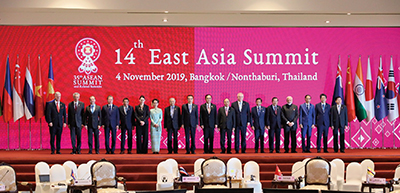 EAS Meeting (November 4, Bangkok, Thailand; Photo: Cabinet Public Relations Office)
EAS Meeting (November 4, Bangkok, Thailand; Photo: Cabinet Public Relations Office)With regard to North Korea, Prime Minister Abe strongly condemned the launches of ballistic missiles by North Korea, and highlighted the importance of the unity of the international community in supporting the U.S-North Korea process to achieve the CVID (complete, verifiable and irreversible dismantlement) of all weapons of mass destruction and ballistic missiles of all ranges by North Korea, in accordance with the UN Security Council resolutions, and stated that it was crucial to maintain full implementation of the UN Security Council resolutions. In addition, he asked for cooperation for the early resolution of the abductions issue. In response, many of the participating countries noted on the importance of a peaceful resolution through complete denuclearization and dialogue. Several countries condemned the missile launches and mentioned the importance of North Korea's compliance with the UN Security Council resolutions.
Regarding the issue of the South China Sea, Prime Minister Abe stated that Japan has taken up the challenge of regional peace and prosperity, and therefore shares serious concerns over the matter with the EAS participating countries. He went on to express his strong opposition to all unilateral attempts to change the status quo, as well as intimidation against other countries, and urged both demilitarization and a peaceful resolution of disputes in accordance with the international law. In addition, he stated that the Code of Conduct (COC) in the South China Sea must be consistent with international law, as reflected in the UNCLOS, and it must not prejudice the legitimate rights and interests of any of the stakeholders. Furthermore, he expressed Japan's support for the basic principles set forth by ASEAN of “full respect for legal and diplomatic processes,” “freedom of navigation,” and “the importance of demilitarization and self-restraint.”
(7) Japan-China-ROK Trilateral Cooperation
Trilateral cooperation among Japan, China, and the ROK continues to be vital from the perspective of promoting exchange and mutual understanding among the three countries that enjoy geographical proximity and share deep historical ties. Furthermore, as economies that play a major role in the world economy and serve as the motive force driving the prosperity of the East Asian region, trilateral cooperation among Japan, China, and the ROK is one of the areas of cooperation which has huge latent potential in efforts to tackle various issues in the international community.
A Japan-China-ROK Trilateral Foreign Ministers' Meeting
The Ninth Japan-China-ROK Trilateral Foreign Ministers' Meeting was held in August in Gubei Water Town in the suburbs of Beijing, China, with China serving as the chair. The three foreign ministers of Japan, China, and the ROK praised the fact that this Japan-China-ROK Trilateral Foreign Ministers' Meeting was held in this crucial year, which marked the 20th anniversary since the beginning of their cooperation. They also affirmed the steady progress made with trilateral cooperation in a wide range of areas due to the Japan-China-ROK Trilateral Foreign Ministers' Meeting, which was the first held in about three years, and discussed the current state of specific cooperation and the course for future cooperation. Foreign Minister Kono emphasized the need to comply with and promote the G20 Principles for Quality Infrastructure Investment, as well as the importance of people-to-people exchanges. In particular, he appealed for the expansion of people-to-people exchanges afforded by the opportunity of the Olympic and Paralympic Games, which have been hosted in relay-fashion by the three countries. In addition, he also welcomed the developments seen in academic exchanges, such as with “Campus Asia” (a plan to enhance exchanges between universities in Japan, China, and the ROK).
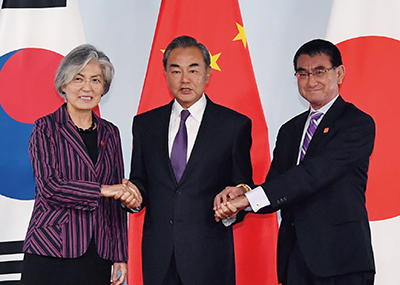 Japan-China-ROK Trilateral Foreign Ministers' Meeting
Japan-China-ROK Trilateral Foreign Ministers' Meeting (August 22, Beijing and Gubei Water Town, China)
B Japan-China-ROK Trilateral Summit
The Eighth Japan-China-ROK Trilateral Summit was held in Chengdu, China, in December. The three leaders summarized their trilateral cooperation to date and discussed the direction for future cooperation over the coming decade in this crucial juncture marking the 20th anniversary of Japan-China-ROK cooperation. In particular, they agreed to continue promoting trilateral cooperation centered around cooperation in the three areas of the environment, the aging of society, and people-to-people exchanges. In addition, they discussed the regional situation, including the situation of North Korea. Prime Minister Abe stated that Japan would implement the contents of the agreement reached by the three countries, as representatives of Asia, moving forward, and would promote them to the world, including Asia, based on the G20 Osaka Leaders' Declaration adopted at the G20 Osaka Summit that included consensus in the areas of trade, investment, quality infrastructure investment, and marine plastic litter. In addition, the three leaders also exchanged their views on the international situation as well.
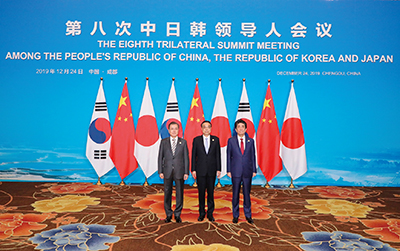 Japan-China-ROK Trilateral Summit (December 24, Chengdu, China; Photo: Cabinet Public Relations Office)
Japan-China-ROK Trilateral Summit (December 24, Chengdu, China; Photo: Cabinet Public Relations Office)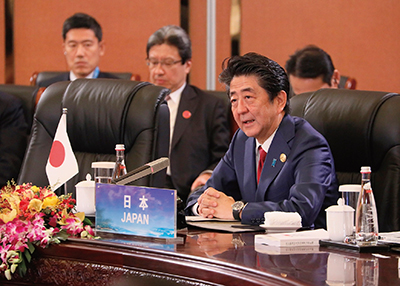 Prime Minister Abe speaking at the Japan-China-ROK Trilateral Summit (December 24, Chengdu, China; Photo: Cabinet Public Relations Office)
Prime Minister Abe speaking at the Japan-China-ROK Trilateral Summit (December 24, Chengdu, China; Photo: Cabinet Public Relations Office)(8) Asia-Pacific Economic Cooperation (See Chapter 3, Section 3, 2-(3))
Consisting of 21 economies (countries and regions) in the Asia-Pacific region, APEC promotes regional economic integration and cooperation across the region among the member economies on a voluntary basis. As the Asia-Pacific region is positioned as the “world's growth center,” strengthening economic cooperation and trust in the economic aspect in this region is very important in pursuing Japan's further economic development.
At APEC Chile 2019, Japan, which chaired the G20 in 2019, coordinated with Chile, the APEC Chair, through sharing the outcomes of the G20 Osaka Summit which are related to issues such as the digital economy, marine plastic litter, and women's empowerment. The APEC Economic Leaders' Meeting which was scheduled in November 2019 was canceled due to domestic instability in Chile. Meanwhile, at meetings including the APEC Ministers Responsible for Trade Meeting held in May 2019 in Chile, Japan announced that it would continue to contribute as a standard-bearer of free trade in aiming for the growth and development of the Asia-Pacific region as a whole as it is the core of a “Free and Open Indo-Pacific,” which Japan has been promoting.
(9) South Asian Association for Regional Cooperation (SAARC)
SAARC was officially inaugurated in 1985 with multiple objectives such as enhancing the welfare of citizens of the South Asian countries, and cooperation and collaboration in economic and social development and cultural areas. As of 2019, SAARC has eight member states (India, Pakistan, Bangladesh, Sri Lanka, Nepal, Bhutan, Maldives, and Afghanistan) and nine observer countries and institutions including Japan. As a relatively loose framework of regional cooperation, SAARC has worked primarily on economic, social and cultural areas, through summit meetings and meetings of the Council at the ministerial level (foreign ministers' meetings). As part of youth exchange between Japan and SAARC, Japan has invited around 3,615 people to date (162 people in FY2019).

